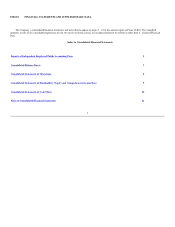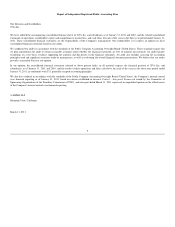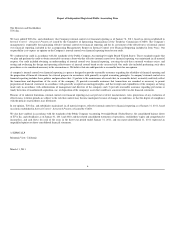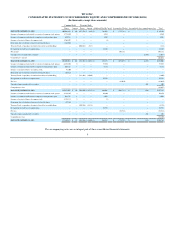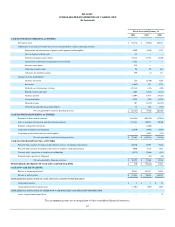TiVo 2010 Annual Report Download - page 15
Download and view the complete annual report
Please find page 15 of the 2010 TiVo annual report below. You can navigate through the pages in the report by either clicking on the pages listed below, or by using the keyword search tool below to find specific information within the annual report.
End users have the right to cancel their subscription within 30 days of subscription activation for a full refund. TiVo establishes allowances for expected
subscription cancellations.
Also included in service revenues are fees received from multiple system operators (“MSO”s), such as Comcast, DIRECTV, and Seven/Hybrid TV, as
well as other service providers for provision of the TiVo service that are recognized as services are provided. When applicable, a percentage of such fees is
deferred and recognized as technology revenues when development services are provided or as service revenues when the right to use these deferred fees is
forfeited.
Technology Revenues . The Company recognizes technology revenues under technology licensing and engineering services agreements dependent upon
the type of arrangement. In instances where TiVo hosts the TiVo service, the Company determines whether evidence of an arrangement exists, delivery has
occurred, the fee is fixed or determinable and collection is probable. Revenue recognition is deferred until such time as all of the criteria are met. Elements
included in the Company’s arrangements may include technology licenses and associated maintenance and support, engineering services and other services.
Vendor specific objective evidence (“VSOE”) or verifiable objective evidence (“VOE”) of fair value, respectively, is required for all undelivered elements in
order to recognize revenue related to the delivered element. The timing of revenue recognition related to these transactions will depend, in part, on whether
the Company can establish VSOE or VOE for undelivered elements and on how these transactions are structured. As such, revenue recognition may not
correspond to the timing of related cash flows or the Company’s work effort. The Company has established VSOE of fair value for engineering services based
on hourly rates charged for engineering services sold on a standalone basis.
In arrangements which include engineering services that are essential to the functionality of the licensed technology or involve significant customization
or modification of the software, the Company recognizes revenue using the percentage-of-completion method, if the Company believes it is able to make
reasonably dependable estimates of the extent of progress toward completion. The Company measures progress toward completion using an input method
based on the ratio of costs incurred, principally labor, to date to total estimated costs of the project. These estimates are assessed continually during the term of
the contract, and revisions are reflected when the changed conditions become known.
In some cases, it may not be possible to separate the various elements within the arrangement due to a lack of VSOE or VOE for undelivered elements in
the contract or because of the lack of reasonably dependable estimates of total costs. In these situations, provided that the Company is reasonably assured that
no loss will be incurred under the arrangement, the Company recognizes revenues and costs based on a zero profit model, which results in the recognition of
equal amounts of revenues and costs, until the engineering professional services are complete. Costs incurred in excess of revenues are deferred up to the
amount deemed recoverable. Thereafter, any profit from the engineering professional services is recognized over the period of the maintenance and support or
other services that are provided, whichever is longer. If the Company cannot be reasonably assured that no loss will be incurred under the arrangement, the
Company will account for the arrangement under the completed contract method, which results in a full deferral of the revenue and costs until the project is
complete.
For all arrangements, provisions for losses are recorded when estimates indicate that a loss will be incurred on the contract.
As of January 31, 2011, TiVo had $13.8 million and $2.1 million of deferred costs related to development agreements and is classified on its
consolidated balance sheets as deferred costs of technology revenues, current and deferred costs of technology revenues, long term, respectively. For the fiscal
year ended January 31, 2010 TiVo had $441,000 of deferred costs classified on its consolidated balance sheets as deferred costs of technology revenues,
current.
Hardware Revenues. Revenues are recognized upon product shipment to the customers or receipt of the products by the customer, depending on the
shipping terms, provided that all fees are fixed or determinable, evidence of an arrangement exists and collectibility is reasonably assured. End users have the
right to return their product within 30 days of the purchase. TiVo establishes allowances for expected product and service returns and these allowances are
recorded as a direct reduction of revenues and accounts receivable.
14


